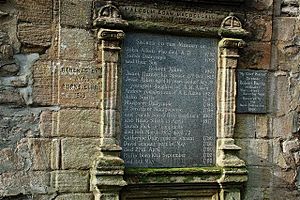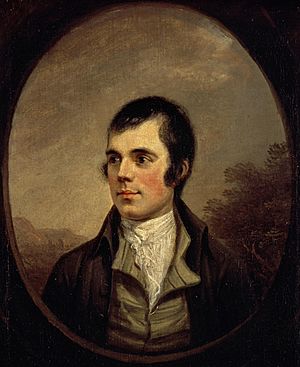Robert Aiken facts for kids
Quick facts for kids
Robert Aiken
|
|
|---|---|

Memorial to Robert Aiken and his family, Auld Kirk, Ayr
|
|
| Born | 23 August 1739 Ayr, Scotland
|
| Died | 24 March 1807 Ayr, Scotland
|
| Occupation | Lawyer or Writer |
Robert Aiken was a close friend and big fan of the famous Scottish poet Robert Burns. He was born in 1739 in Ayr, Scotland. His father, John Aiken, was a sea captain, and his mother was Sarah Dalrymple. Robert became a lawyer in Ayr. Burns even gave him the nickname "Orator Bob" in his poem "The Kirk's Alarm." This nickname showed how good Robert was at speaking, as he was known for his powerful and beautiful speeches.
Contents
Who Was Robert Aiken?
His Life and Personality
Robert Aiken was a successful and friendly person. He was described as being small and round. He married Janet Hunter on March 25, 1771. Janet passed away in 1815. Robert died in 1807 when he was 67 years old. They are both buried in the Auld Kirk graveyard in Ayr. Robert was also a cousin to the Earl of Glencairn.
Robert was very famous for his speaking skills. Robert Burns called him Orator Bob in his poem "The Kirk's Alarm." Here is a part of that poem:
|
Town of Ayr, town of Ayr, |
Aiken was part of the Ayr Library Society. This group allowed people who paid a fee to read the newest books. He was also an officer of the society. The Aiken family memorial at the Auld Kirk in Ayr was fixed up in 1919 by the Ayr Burns Club. It was restored again in 1960 by the Robert Burns World Federation. A.H. Aiken, mentioned on the monument, was Robert's son, Andrew Hunter Aiken.
Friend of Robert Burns
Robert Aiken likely met Robert Burns around 1783. Burns once said that he didn't truly understand his own poems until he heard Robert Aiken read them aloud. In letters to their friend John Ballantyne, Burns called Aiken his "first poetic patron" and "first kind patron." A patron is someone who supports an artist.
In a letter from December 1786, Burns called Aiken his "Dear Patron of my Virgin Muse." This suggests that Aiken might have helped Burns meet William Smellie and William Creech. They were Burns's printer and publisher for his book, Poems, Chiefly in the Scottish Dialect (Edinburgh Edition). Before this, Aiken had already helped Burns by collecting money for nearly a quarter of all the copies sold of Burns's first book, the Kilmarnock Edition.
Burns wrote that he found "honor and goodness of heart" in Aiken's friends, Creech and Smellie. In February 1786, Burns also wrote to his friend John Richmond, saying, "My chief patron is Mr Aiken in Ayr who is pleased to express great approbation of my works."
Burns dedicated his poem "The Cotter's Saturday Night" to Aiken. This poem was first printed in the Kilmarnock Edition in 1786. In the first part of the poem, Burns praises his friend:
|
My lov'd, much honour'd, much respected friend! |
Robert Aiken also helped his friend Gavin Hamilton in a legal dispute in 1785. Aiken successfully defended Hamilton. This event inspired Burns to write the poem "Holy Willie's Prayer."
Burns showed his admiration for Aiken in a short poem called "Epitaph for Robert Aiken Esq":
|
"Know thou, O stranger to the fame |
Robert Aiken worked as a Surveyor of Taxes. In 1786, he helped create a list of items at the Burns family farm, Mossgiel. Burns wrote a funny poem about this list for Aiken:
|
Sir, as your mandate did request, Imprimis, then, for carriage cattle, For men, I've three mischievous boys, I've nane in female servant station, And now, remember, Mr. Aiken, This list, wi' my ain hand I wrote it, Robert Burns. |
Robert Aiken's daughter, Grace, said that a clerk in her father's office lost or possibly stole most of the letters Burns had written to him. Only seven letters survived. One of these letters, from October 1786, shows Burns's first thoughts about joining the tax service.
Aiken was very interested in the Alloway Burns Club. He often led or attended the club's 'Burns Suppers' until he passed away in 1807. These suppers celebrate Robert Burns.
Epistle to a Young Friend
Robert Burns wrote the poem "Epistle to a Young Friend" for Andrew Hunter Aiken. Andrew was Robert Aiken's oldest son. This poem was very inspiring. General Sam Houston even wrote to his own son, telling him to pay special attention to this poem. He said it was "one of the most salutary as well as one of the safest guides I have met with in life."
Andrew's oldest son, Peter, owned the original handwritten copy of Burns's "The Cotter's Saturday Night." Peter also led the Robert Burns celebrations in Bristol in 1859.
Robert Aiken and Burns's Marriage
In 1786, James Armour, the father of Jean Armour, went to Robert Aiken. He wanted to try and cancel the marriage between Jean Armour and Robert Burns. This marriage was not done in the usual way, but it was still considered valid. Some stories say that Robert Aiken had the marriage paper. However, earlier records suggest Jean Armour herself had it. It is said that to make Jean's father happy, Aiken cut the names of the couple from the marriage document. But this probably didn't change the marriage's legal status.
Burns wrote to Gavin Hamilton about this event. He expressed his feelings about Jean Armour's actions, but he still hoped Aiken would remain his friend. Robert Aiken's grandson later published a book about Robert Burns. In it, he said that his grandfather's friendship with Burns never broke down. He also denied that his grandfather helped James Armour with the marriage document.
In 1788, Robert Burns and Jean Armour were finally legally married. Burns was surprisingly quiet about it. Gavin Hamilton's oldest daughter, Jacobina, remembered how she only found out about the marriage at breakfast one day. Burns and Robert Aiken were there. When Jacobina apologized to Aiken for not having his usual boiled egg, Burns said, "if she cared to send over the way to Mrs Burns she might have some." This was how she learned that Jean was now "Mrs. Burns."
See also
- Lesley Baillie
- John Ballantine
- Alison Begbie
- Nelly Blair
- Isabella Burns
- May Cameron
- Mary Campbell (Highland Mary)
- Jenny Clow
- Gavin Hamilton
- Helen Hyslop
- Nelly Kilpatrick
- Jessie Lewars
- John McMurdo
- Anne Rankine
- Isabella Steven
- Peggy Thompson
 | Bayard Rustin |
 | Jeannette Carter |
 | Jeremiah A. Brown |


